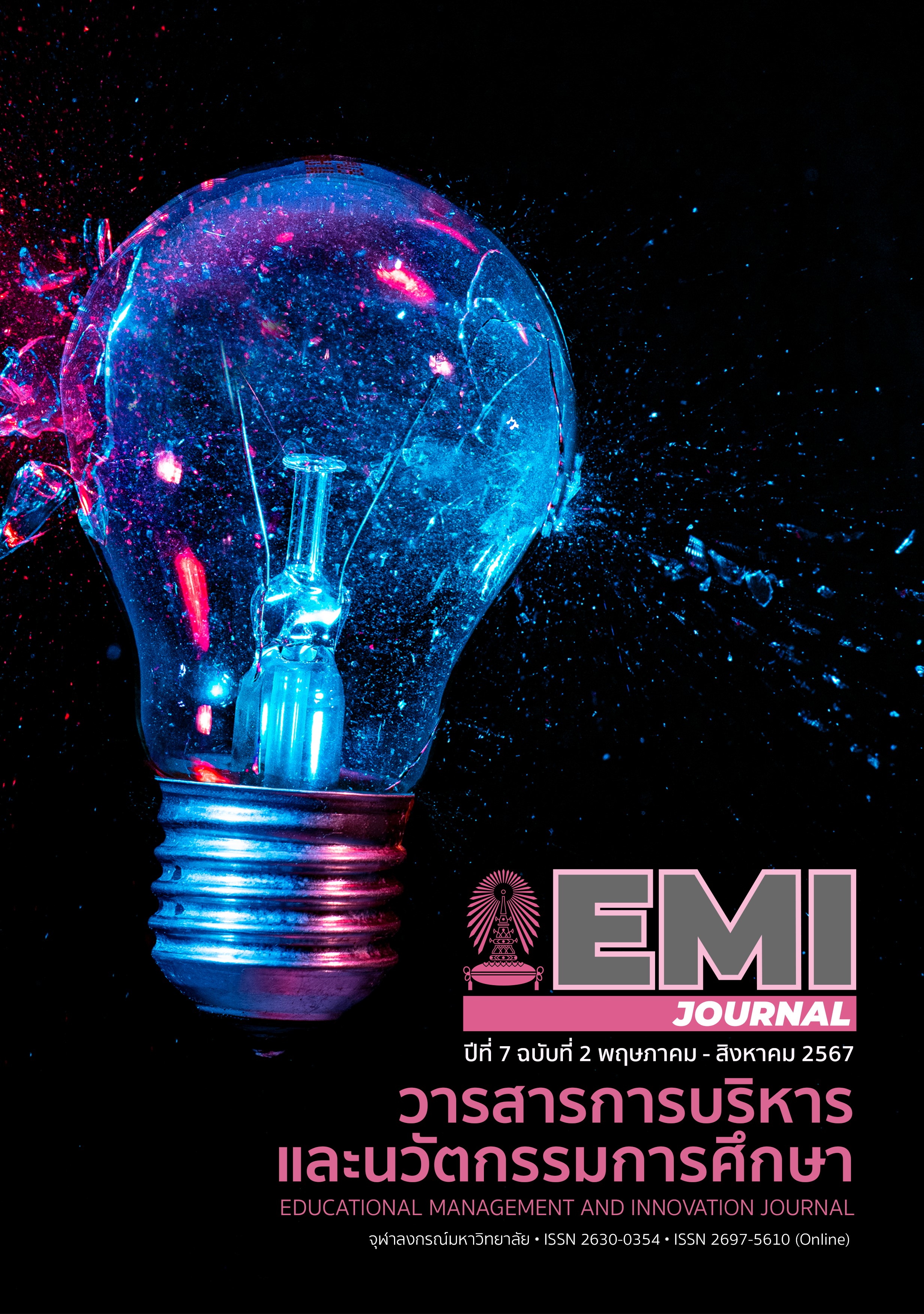The Factor Analysis of Digital Competency of School Administrator in Phitsanulok Province Secondary Schools
การวิเคราะห์องค์ประกอบสมรรถนะดิจิทัลของผู้บริหารสถานศึกษา ในโรงเรียนมัธยมศึกษาจังหวัดพิษณุโลก
คำสำคัญ:
การวิเคราะห์องค์ประกอบ, สมรรถนะดิจิทัล, ผู้บริหารสถานศึกษาบทคัดย่อ
การวิจัยนี้มีวัตถุประสงค์เพื่อวิเคราะห์องค์ประกอบสมรรถนะดิจิทัลของผู้บริหารสถานศึกษาในโรงเรียนมัธยมศึกษาจังหวัดพิษณุโลก กลุ่มตัวอย่างที่ใช้ในการวิจัยในครั้งนี้ คือ ผู้บริหารสถานศึกษาและครู ในโรงเรียนมัธยมศึกษาจังหวัดพิษณุโลก ปีการศึกษา 2565 จำนวน 345 คน โดยจำแนกเป็นผู้บริหารสถานศึกษา จำนวน 88 คน ได้มาจากการเลือกแบบเจาะจง และครู จำนวน 257 คน ได้มาจากวิธีการสุ่มแบบแบ่งชั้นตามสัดส่วนของครูในแต่ละสหวิทยาเขตของโรงเรียนมัธยมศึกษาจังหวัดพิษณุโลก เครื่องมือที่ใช้ในการเก็บรวบรวมข้อมูลเป็นแบบสอบถาม วิเคราะห์ข้อมูลด้วยการวิเคราะห์องค์ประกอบเชิงสำรวจ โดยใช้การวิเคราะห์ด้วยวิธีสกัดองค์ประกอบหลักหลังหมุนแกนแบบมุมฉากด้วยวิธี
แวริแมกซ์
ผลการศึกษาพบว่า องค์ประกอบสมรรถนะดิจิทัลของผู้บริหารสถานศึกษาในโรงเรียนมัธยมศึกษาจังหวัดพิษณุโลกพบว่า ประกอบด้วย 6 องค์ประกอบ ได้แก่ 1) การสร้างสรรค์นวัตกรรมดิจิทัล มีค่าน้ำหนักองค์ประกอบระหว่าง 0.559-0.847 2) การสื่อสารและสร้างเครือข่ายดิจิทัลเพื่อการเรียนรู้ มีค่าน้ำหนักองค์ประกอบระหว่าง 0.651-0.810
3) การรู้ดิจิทัลอย่างมีวิจารณญาณ มีค่าน้ำหนักองค์ประกอบระหว่าง 0.711-0.859 4) การพัฒนาสถานศึกษาให้เอื้อต่อการเป็นองค์กรดิจิทัล มีค่าน้ำหนักองค์ประกอบระหว่าง 0.503-0.809 5) ความสามารถในการใช้เทคโนโลยีดิจิทัล มีค่าน้ำหนักองค์ประกอบระหว่าง 0.547-0.770 และ 6) จรรยาบรรณและความปลอดภัยในการใช้ดิจิทัล มีค่าน้ำหนักองค์ประกอบระหว่าง 0.534-0.832 สามารถอธิบายองค์ประกอบสมรรถนะดิจิทัลของผู้บริหารสถานศึกษาในโรงเรียนมัธยมศึกษาจังหวัดพิษณุโลก ได้ร้อยละ 72.60
Downloads
เอกสารอ้างอิง
Chaemchoy, S. (2017). School management in digital era. Phitsanulok: Phitsanulok dot com. [In Thai]
Child and Youth Media Institute. (2018). Indicators of media, information and digital literacy at the personal level to promote democratic citizenship. Bangkok: Child and Youth Media Institute.
[In Thai]
European Union. (2006). Recommendation of the European Union and of the Council of 18 December 2006 on key competences for lifelong learning (2006/962/EC). Retrieved April 16, 2022, from http://eurlex.europa.eu/LexUriServ/LexUriServ.do?uri=OJ:L:2006:394:0010:0018:en:PDF
Ferrari, A. (2013). DIGCOMP: A framework for developing and understanding digital competence in Europe. Luxembourg: Publications Office of the European Union.
International Society for Technology in Education (ISTE). (2009). National Educational Technology Standard for Administrators. Retrieved April 22, 2022, form https://id.iste.org/docs/pdfs/20-14_ISTE_Standards-A_PDF.pdf
Ketia Kellen, A., da Silva, & Patricia, A. (2017). DIGITAL COMPETENCE MODEL OF DISTANCE LEARNING STUDENTS. 14th International Conference on Cognition and Exploratory Learning in Digital Age (CELDA 2017).
Khantong, N., & Boobpha, S. (2021). Digital Skills of School Administrators Affecting Work Motivation of Teachers Under Nongkhai Secondary Educational Service Area Office. Journal of Modern Learning Development, 6(4), 148-163. [In Thai]
Mannila, L., Nordén, L.-Å., & Pears, A. (2018). Digital competence, teacher self-efficacy and training needs. Paper presented at the Proceedings of the 2018 ACM Conference on International Computing Education Research.
Muangklum, S. (2019). The factor analysis of The Digital Capability of Teachers and Educational Personnels in Saraburi Province. [Master’s thesis, Rajamangala University of Technology Thanyaburi]. [In Thai]
Nuansri, M., & Pantuworakul, K. (2021). A Confirmatory Factor Analysis of Digital Competency for Student Teachers of Rajabhat University. Journal of Education Studies, 49(4), 10-11. [In Thai]
Office of the Higher Education Commission (OHEC). (2018). National Higher Education Qualifications Framework Practice Guidelines on Digital Competencies for Undergraduate Qualifications. Official letter no. STH0506(1)/W2086. Office of the Permanent Secretary, Ministry of Education. [In Thai]
Office of the National Digital Economy and Society Commission. (2019). Digital Competency Framework for Thai Citizens. Bangkok: Office of the National Digital Economy and Society Commission. [In Thai]
Pakotang, J. (2018). Digital Leadership For professional school administrators. Ubon Ratchathani: Siritham Offset. [In Thai]
Saenglun, P., & Ruangsuwan, C. (2021). The development guidelines of digital leadership for school administrators Under Khon Kaen Primary Educational Service Area Office 5. Journal of Educational Administration and Leadership, Sakonnakhon Rajabhat University, 11(41), 182. [In Thai]
Sangkhwan, S. (2017). The relationship between technological leadership characteristics and the academic administration of the educational institution administrators under the supervision of Lopburi primary educational service area office 2. [Master’s thesis, Rajamangala University of Technology Thanyaburi]. [In Thai]
Sangpho, Chanthiwasarakit, & Udeeram. (2017). Leadership in Management in the Digital Age: IT and IT-related organizations in Bangkok and its vicinity. Bangkok: College of Innovation, Thammasat University. [In Thai]
Sanpek, S., & Chaowachai, S. (2022). Instructional Leadership in Digital Age of School Under Phrae Primary Educational Service Area Office 2. College of Asian Scholars Journal, 12(3), 105. [In Thai]
Sirisak, K. (2016). Curriculum research on teacher education program for developing Digital Competence enhancement guidance. [Master’s thesis, Chulalongkorn University]. [In Thai]
Somchob, K. (2020). The Study of Digital literacy Components of Supporting Staff in Khon Kaen University, Nongkhai campus. The 21st National Graduate Studies Research Conference (Online). at Pote Sarasin Building, Khon Kaen University, 700-708. Retrieved April 25, 2022, from https://app.gs. kku.ac.th/images/img/support/grc2020/pdfabstracts/HMP5.pdf [In Thai]
Stephanie, C., Riina, V., & Yves, P. (2016). DigComp 2.1: The digital competence framework for citizens with eight proficiency levels and examples of use. Luxembourg: Publications Office of the European Union.
Suttagarn, A., & Chaowachai, S. (2022). Proposed Guidelines Development of Digital Literacy for School Administrator under The Secondary Educational Service Area Office Nan. Educational Management and Innovation Journal, 5(3), 82. [In Thai]
The Office of the Civil Service Commission (OCSC). (2019). Digital skills needed for civil servants and government personnel to transform into digital government (1st Revised Edition). Bangkok: The Office of the Civil Service Commission (OCSC). [In Thai]
The Secondary Educational Service Area Office Phitsanulok Uttaradit. (2022). Action Plan for Fiscal Year 2022. [In Thai]
Vanichbuncha, K. (2021). Advanced Statistical Analysis with SPSS for Windows. Bangkok: Chulalongkorn University Press. [In Thai]
Wiriyapan, T. (2007). Executive skills (2nd ed.). Bangkok: G.P.CYBERPRINT. [In Thai]
Wongkijrungruang, W., & Jittaroek, A. (2017). 21st Century Skills: Rethinking How Students Learn. Retrieved September 30, 2022, from https://thaidigizen.com. [In Thai]
ดาวน์โหลด
เผยแพร่แล้ว
ฉบับ
ประเภทบทความ
สัญญาอนุญาต
ลิขสิทธิ์ (c) 2024 วารสารการบริหารและนวัตกรรมการศึกษา

อนุญาตภายใต้เงื่อนไข Creative Commons Attribution-NonCommercial-NoDerivatives 4.0 International License.



